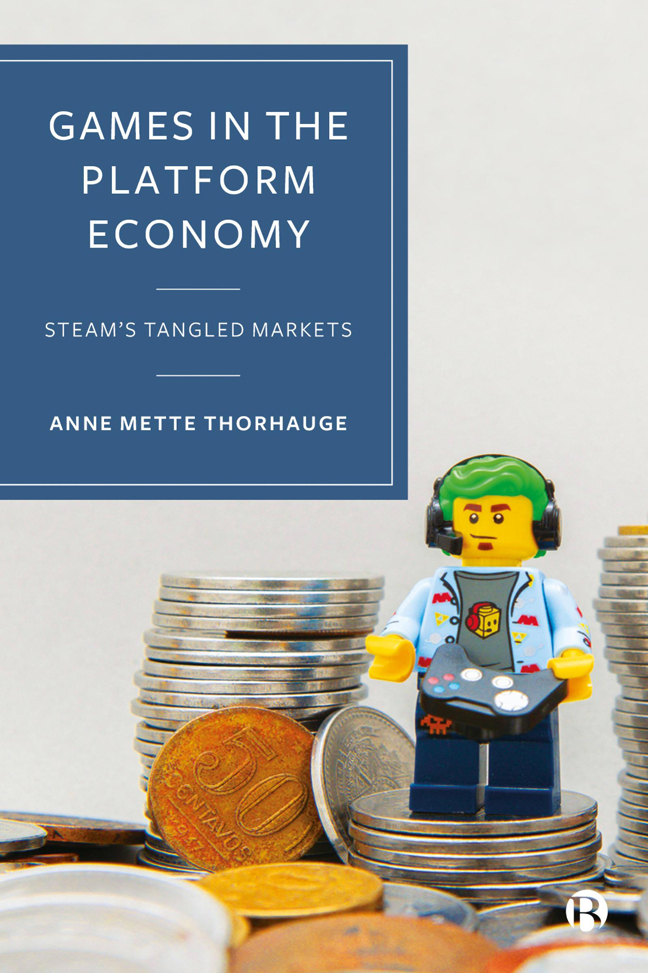Book contents
- Frontmatter
- Dedication
- Contents
- List of Figures and Table
- Acknowledgements
- 1 Introduction: Steam's Tangled Markets
- 2 Platform Configurations in Gaming
- 3 Economic Sociology and the Analysis of Platforms as Markets
- 4 Valve Corporation and the Steam Platform
- 5 Steam's Business Model
- 6 Shaping Market Interactions on the Steam Platform
- 7 Economic Actors on the Steam Platform
- 8 Player Trading beyond Steam
- 9 User Monetization and Value Creation in Tangled Markets
- Notes
- References
- Index
9 - User Monetization and Value Creation in Tangled Markets
Published online by Cambridge University Press: 23 January 2024
- Frontmatter
- Dedication
- Contents
- List of Figures and Table
- Acknowledgements
- 1 Introduction: Steam's Tangled Markets
- 2 Platform Configurations in Gaming
- 3 Economic Sociology and the Analysis of Platforms as Markets
- 4 Valve Corporation and the Steam Platform
- 5 Steam's Business Model
- 6 Shaping Market Interactions on the Steam Platform
- 7 Economic Actors on the Steam Platform
- 8 Player Trading beyond Steam
- 9 User Monetization and Value Creation in Tangled Markets
- Notes
- References
- Index
Summary
In this concluding chapter, I will discuss how user commodification is expanded and intensified in tangled markets and how this development challenges current approaches to the regulation of platforms. Since Smythe's seminal work on the ‘audience commodity’ (1981), the role of advertising has been a key focus in the conceptualization of commodification processes in commercial media, and it remains an important backdrop to widely used concepts such as ‘the attention economy’ (Goldhaber, 1997) and ‘the marketplace of attention’ (Webster, 2014). Of course, advertising as a business model has been expanded throughout this history and commodification has been intensified through mechanisms of datafication (Van Dijck et al, 2018: 37) and a gradual shift from attention to engagement as a key focus of this commodification (Ørmen and Gregersen, 2022). As the previous chapters indicate, advertising is by no means the only way in which users are monetized and commodified on digital platforms and the specific approach employed by Valve on the Steam platform allows us to consider in more detail alternatives beyond advertising. On Steam, users are also addressed as traders that create value for the platform by way of their economic action. This business model, more specifically, consists in converting the value players attach to their game worlds into market value through the integration of transactional affordances into a range of contexts on the platform (see Chapter 5). In this way, the core of Steam's business model is not the audience commodity but rather the commodification of player-driven economies.
In this chapter, I will argue that existing approaches to audience and user commodification in the context of digital media primarily position users as consumers, though the category of consumer is extended in a range of ways. In response to this, I will suggest that all steps in the process, from production over exchange to consumption, have been commodified in the context of Steam's tangled markets. Users may participate as consumers, producers, or traders and still be commodified in this platform business model. In the subsequent sections of this chapter, I will firstly track the concept of commodification and the audience commodity historically, and how this concept and line of thought has extended into digital communication environments. As an extension of this, I will discuss how insights from the analysis of Steam's tangled markets may inform our understanding of the user not primarily as consumer but as consumer, producer, and trader.
- Type
- Chapter
- Information
- Games in the Platform EconomySteam's Tangled Markets, pp. 119 - 130Publisher: Bristol University PressPrint publication year: 2023



